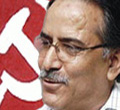
The Nepal Prime Minister Pushpa Kamal Dahal (Prachanda) has come out with some popular policies to get rid of the criticism poured on him from home and abroad. The Maoist leader, who was sworn in as the head of the government at Kathmandu, faced condemnation from world communities following the assassination of a young journalist on January 12. Uma Singh, a broadcaster and rights activist was suspectedly killed by the sympathizers of Maoists.
Moreover, Prachanda has been criticized for his failure to deliver for the common people, where most of them are living under poverty line. The supreme leader of Communist Party of Nepal (Maoist) emerged as the Prime Minister in August following the April 10 polls, where his party came out as the largest party in the Constituent Assembly. The government has been supported by five other parties including the Communist Party of Nepal (Unified Marxist Leninist), which is the third largest party in the Assembly after Nepali Congress (now in the opposition).
The primary objective of the present government is to draft the constitution for the poverty stricken country of around 27 million population and go for a general election within three years. But the first five months of the Maoist-led government turned out to be a mere failure as the government has not progressed in its mission. Rather Prachanda, who led a decade long armed movement in Nepal that killed more than 15,000 people to dethrone the monarchy, found himself amidst unnecessary controversies because of inexperience, intolerance and casual comments.
Understanding the ambience, Prachanda appeared in the television to address the nation and declare some popular initiatives like banning the dowry and caste based discrimination in Nepal. His announcement was aimed to target the women, ethnic communities, backward groups in the society.
Recently, Prachanda asked all government secretaries to focus on the effective implementation of the policies for the betterment of the people. Inviting the bureaucratic heads, Prachanda urged them to take bold and efficient steps to implement the programmes adopted by the coalition government. He even clarified that he wanted outcomes and that was not a 'not a routine business call'.
The 55-year-old former revolutionary admitted that his government was yet to deliver as expected by the common people. He however did not forget to blame the bureaucracy for the non-performance.
It may be mentioned that Prachanda made statements in public that the bureaucracy and the Army were not supportive to him. He tried to convince the Nepali people few weeks back that it was really difficult to run a government if these two estates remained reluctant in extending necessary cooperation. Prachanda even threatened to resign from the government and 'go to the people'.
Quoting the Prime Minister, Nepali media reported Prachanda as saying, "It is impossible to go for the task (drafting of a new constitution for the federal democratic republic of Nepal) without the support and consensus from the major political parties. If they (read Nepali Congress) do not support the government, I will resign and go to the people."
His comments were promptly hit-backed by the NC chief Girija Prasad Koirala saying, "They (the Maoist led government) are not serious about the job (drafting of the constitution). What they want only to continue in power and pursue their agendas for a complete tyrannical rule."
The veteran Nepali politician and also a former prime minister, Koirala pointed out that eight months had already passed since the Constituent Assembly was formed, but its primary objective was yet to get visualized. The Constituent Assembly had already set May 2010 as the deadline for preparing the draft of the constitution, which would be essential for legitimizing a federal democratic republic regime at Kathmandu.
The article no 64 of Interim Constitution of Nepal says that term of a Constituent Assembly should be two years from the date of its first meeting (if otherwise not dissolved by a resolution in the Constituent Assembly itself). The term may be extended for another six months by a resolution in the Assembly, if the task is not completed due to some serious political uncertainties (like a state of emergency) in the country.
Another former premier of Nepal, Sher Bahadur Deuba (a Nepali Congress leader) also dismissed Prachanda's claim that traditional forces were creating troubles in the governance. He alleged that the killing of innocent people by Maoists, deterioration of law & order situation across the country and the price rise of essential commodities only marked the first hundred days of the government. After all, Deuba commented, it is always difficult to run a government than to kill people (as an armed rebel).
|
|


Comments: